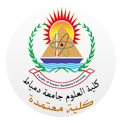كلية العلوم | جامعة دمياط
شارك برأيك
أرشيف الأخبار
المعايير الأكاديمية لبرنامج الكيمياء الحيوية
National academicstandards (NARS) of basic science and chemistry
Intended Learning Outcomes (ILO's):
-
Knowledge and Understanding
Chemist must acquire the knowledge and understanding of:
1.1 The related basic scientific facts, concepts, principles and techniques.
1.2 The relevant theories and their applications.
1.3 The processes and mechanisms supporting the structure and function of the specific topics.
1.4 The related terminology, nomenclature and classification systems.
1.5 The theories and methods applied for interpreting and analyzing data related to discipline.
1.6 The developmental progress of the program-related knowledge.
1.7 The relation between the studied topics and the environment.
1.8 Chemical concepts, nomenclature, formulae and units.
1.9 Characteristics of the different states of the matter and elements including trends within the periodic table and the related theories.
1.10 The principles, procedures and techniques used m chemical analysis, characterization and structural investigations of different chemical compounds.
1.11 The major types of chemical reactions, their characteristics and mechanisms as well as their kinetics including catalysis.
1.12 The principles of thermodynamics and quantum mechanics including their applications m chemistry.
1.13 The constitution and properties of the different chemical compounds, including the main synthetic pathways and the relation between the properties of individual atoms and molecules. 1.14 The current issues of chemical research and technological development
-
Practical and Professional Skills
The chemist must be able to:
2.1 Plan, design, process and report on the investigated data, using appropriate techniques and considering scientific guidance.
2.2 Apply techniques and tools considering scientific ethics.
2.3 Solve problems using a range of formats and approaches.
2.4 Identify and criticize the different methods used in addressing subject related issues.
2.5 Assess risk in laboratory work taking into consideration the specific hazards associated with the use of chemical materials as well as the safe and proper operation of the laboratory techniques.
2.6 Conduct standard laboratory procedures involved in analytical and synthetic work.
2.7 Monitor by observation and measurements the chemical properties or changes, including systematic recording and technical reporting.
-
Use computational packages and tools in chemical investigations
-
Intellectual Skills
The chemist must be able to:
3.1 Differentiate between subject-related theories and assess their concepts and principles.
3.2 Analyze, synthesize, assess and interpret qualitatively and quantitatively science relevant data.
3.3 Develop lines of argument and appropriate judgments in accordance with scientific theories and concepts.
3.4 Postulate and deduce mechanisms and procedures to handle scientific problems
3.5 Construct several related and integrated information to confirm, make evidence and test hypotheses.
3.6 Differentiate between the different states of the matter, elements and compounds based on the recognition and quantification of the properties.
3.7 Employ computational software's and data-processing skills· in handling of chemical information and analysis of chemical data.
3.8 Explain concepts and determine the efficiency of chemical systems by applying mathematical expressions.
3.9 Analyze chemical data to identify and confirm chemical structures as well as determine chemical composition.
-
Propose and conclude mechanisms for physical and chemical processes
-
General and Transferable Skills
The chemist must be able to:
4.1 Use information and communication technology effectively.
4.2 Identify roles and responsibilities, and their performing manner.
4.3 Think independently, set tasks and solve problems on scientific basis.
4.4 Work in groups effectively; manage time, collaborate and communicate with others positively.
4.5 Consider community linked problems, ethics and traditions.
4.6 Acquire self- and long life-learning.
4.7 Apply scientific models, systems, and tools effectively.
4.8 Deal with scientific patents considering property right.
4.9 Exhibit the sense of beauty and neatness

 عربي
عربي
 English
English
 Française
Française
 Español
Español